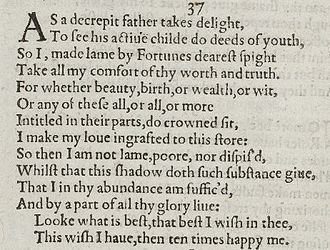| Sonnet 37 | |||||||
|---|---|---|---|---|---|---|---|
 Sonnet 37 in the 1609 Quarto | |||||||
| |||||||
Shakespeare's Sonnet 37 returns to a number of themes sounded in the first 25 of the cycle, such as the effects of age and recuperation from age, and the blurred boundaries between lover and beloved. However, the tone is more complex than in the earlier poems: after the betrayal treated in Sonnets 34–36, the speaker does not return to a simple celebration.
Just as an aged father takes delight in the youthful actions of his son, so I, crippled by fortune, take comfort in your worth and faithfulness. For whether it's beauty, noble birth, wealth, or intelligence, or all of these, or all of these and more, that you possess, I attach my love to it (whatever it is), and as a result I am no longer poor, crippled, or despised. Your mere shadow (present in me) provides such solid reality to me that I am complete with it. I wish whatever is best in you, and if this wish is granted, then I will be extremely happy.
- ^ Pooler, C[harles] Knox, ed. (1918). The Works of Shakespeare: Sonnets. The Arden Shakespeare [1st series]. London: Methuen & Company. OCLC 4770201.